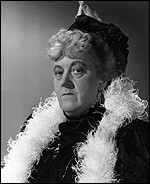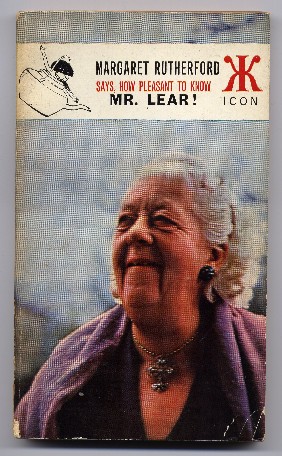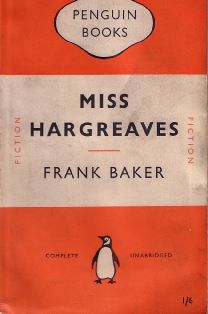I owe a great deal to Miss Hargreaves, a remarkable woman who was born, literally, on ‘the spur of the moment’ and whose history was recorded by Frank Baker, a writer of genius deserving wider recognition and appreciation than he currently enjoys… The story of how Miss Constance (‘Connie’) Hargreaves entered my life, must begin with my fascination with another lady who shared her surname: Mrs Alice Hargreaves who, before her marriage, had been Alice Pleasance Liddell, the child muse of the Reverend Charles Lutwidge Dodgson, better known as ‘Lewis Carroll’. From a very young age I was devoted to Carroll’s ‘Alice’ books and my a passionate fascination with the denizens of Wonderland and Looking-glass World inevitably sent me exploring neighbouring islands in the Ocean of Nonsense in search of other fantastical creatures. I eventually journeyed to an archipelago discovered by one Edward Lear that was inhabited by Owls and Pussycats, Jumblies, Dongs with Luminous Noses and Pobbles who have no toes… Such was my youthful admiration for these two great nonsense writers that I knew most of their verse by heart and, while still a schoolboy, began collecting books and magazine articles about them and their extraordinary creations. I was also, by then, an avid film fan with a particular fondness for British screen eccentrics such as Robert Morley, Joyce Grenfell, Alastair Sim and Margaret Rutherford. When I was fourteen, we went on a family holiday to Hastings and, on arriving at the railway station, I spotted an intriguing and innovative contraption: a dispensing machine that delivered not sweets or bags of crisps, but paperback books! One of the titles on offer was entitled ‘Margaret Rutherford says, "How Pleasant to Know Mr Lear!"’
Despite failing to find any information about Constance Hargreaves and her ‘Wayside Bundle’, I treasured Miss Rutherford’s anthology and being, at the time, an aspiring cartoonist, was prompted to draw some new illustrations to Lear's verses that I sent to the actress, so beginning a correspondence across several years. Firstly, therefore, I am grateful to Miss Hargreaves (and Frank Baker) for that 'introduction' to a remarkable and unique performer. But that is not the extent of my indebtedness… Although I had not succeeded in locating any published works by Constance Hargreaves,
the name remained in my consciousness as an unsolved mystery until the
day, a year or two later, when I was wandering around my local branch
of Woolworth’s, and came across what, in retail-speak, is called a 'dump-bin'
containing a lot of paperbacks at bargain prices.
One
title amongst the jumble caught my eye: 'Miss Hargreaves' by
Frank Baker...
It
was, it said, “a profoundly uncanny tale of fantasy and imagination”.
I opened it and came across a few lines of verse:
“I talk to them of candlesticks and
pears,
Of clothes lines, postal orders, wheelback
chairs…”
Was
this a list of items purchased by the Jumblies when they went to sea
in a sieve and sailed to “a land all covered with trees”? Or were they,
perhaps, among the possessions offered by the Yonghy-Bonghy-Bò to the
Lady Jingly Jones as a marriage dowry? No! They were part of a poem
by the author of the elusive ‘Wayside Bundle’!
‘Miss
Hargreaves’ had first appeared in 1940, but this paperback edition,
published twenty-five years later by Panther, had a new postscript by
the book’s narrator, Norman Huntley, and a selection of verses from
the ‘Bundle’, including one that began to explain the mystery
of the references in the introduction to Margaret Rutherford’s anthology
of Lear:
“I sometimes feel that I am but a
thought,
A piece of thistledown, a thing of
naught;
Rocked in the cradle of a craftsman’s
story…”
The penny dropped and I instantly snatched up the book, along with another novel by the same author entitled ‘The Birds’ - as a film fan with a fondness for Hitchcockian horrors, I was now doubly intrigued!
Inspired by Frank Baker’s story - but losing sight of the fact that it was a story - I also 'dreamt up' an imaginary character with the help of my best friend, and, like Norman, we wrote her a letter... I
can remember nothing about our creation and whilst, sadly, we did not
have the success 'enjoyed' by Norman and Henry, I have to tell you that
the undelivered - indeed undeliverable - letter was, very mysteriously,
never returned to sender!
My
love for both Miss Hargreaves and Mr Lear continued over the years and
in 1978, following my first radio dramatisation (a 45-minute play based
on another nonsense work, James Thurber's ‘The Wonderful O’),
I was asked whether I had any other ideas for possible adaptations,
I immediately suggested Frank Baker's ‘Miss Hargreaves’...
The
response was, for me, disappointing: the BBC still had, in its archives,
a recording of an earlier radio dramatisation made by Frank Baker himself
and with Margaret Rutherford in the title role; they were not, therefore,
interested in my proposal for a new production. Nevertheless, they did
civilly enquire whether I had any other ideas and I impetuously
suggested dramatising The Lord of the Rings and that, eventually,
is exactly what I did!
So,
I am grateful - once again - to Miss Hargreaves and Mr Baker for helping
me take a step towards the most celebrated job in my radio-writing career...
Following
the Sony-Award winning success of my subsequent radio dramatisations
of Mervyn Peake's ‘Titus Groan’ and ‘Gormenghast’ in 1985,
I took the ‘Miss Hargreaves’ project back to the BBC, via my
fellow prize-winner, director Glyn Dearman.
On
this occasion, the BBC bought the idea, commissioning a 90-minute dramatisation
for Radio 4’s 'Saturday Night Theatre' slot.
Joan
Hickson was my first choice for the title role (because she reminded
me of the ghostly picture of Miss Hargreaves on the cover of the Panther
edition) but she was unavailable as was another possible player, Peggy
Ashcroft. The part eventually went to Jean Anderson - famous from the
TV series, Tenko - who perfectly captured Miss Hargreaves’ vacillating
moods, by turn pathetically frail and formidably feisty.
Young
Dale Rapley, now a prolific theatre actor, played Norman Huntley while
David Swift gave an engaging portrayal of Norman’s father, Cornelius,
a slightly dotty antiquarian bookseller. The cast also included Donald
Gee (Mr Boynton in ‘Born and Bred’) and Leonard Fenton (‘EastEnders’
sometime Doctor Legg) who yapped for Sarah the terrier and squawked
for the tirelessly loquacious Dr Pepusch!
I
asked David Hewson, a former school-friend who was now a professional
composer, to write the music for Miss Hargreaves' harp and Cornelius
Huntley's violin compositions. The results - combined into a beautifully
evocative and haunting theme - were both mysterious and melancholy.
‘Miss
Hargreaves’ was broadcast on 21 October 1989 and - at long last
- I was able to repay a little of my indebtedness to Frank Baker.
Soon
afterwards, the story turned full circle, when Dave Hewson and I collaborated
on writing a show with music based on Edward Lear's life and poetry.
Entitled ‘To Sea in a Sieve’, the production was staged
at the 1990 Edinburgh Festival Fringe and was revived at the Westminster
Theatre in London the following year with myself in the role of Edward
Lear and actress Polly March playing everyone else!
On
my dressing table at each performance, lay my copy of ‘Margaret Rutherford
says, "How Pleasant to Know Mr Lear!"’ with Frank Baker’s introduction
containing that curiously disturbing quotation from the writings of
Constance Hargreaves:
“Cleft in the narrow gulf of gusty
grief,
My soul is like a cricket on the leaf…”
Norman Huntley never knew what became of Miss Hargreaves when she disappeared out of his life as mysteriously as she had entered it, but I believe that she lives on still - dancing across the Great Gromboolian Plain to the plaintive pipe of the lugubrious Dong, playing her harp as the Jumblies whistle and warble their moony song, or simply sitting on a little heap of barley exchanging philosophic contemplations with Lear’s agèd Uncle Arly on whose nose was forever perched a pea-green cricket…
Our sincere thanks to Brian for this contribution and for conveying such enthusiasm for Frank Baker's work. To find out more about Brain Sibley and his books and broadcasts please visit www.briansibley.com. |
Do you know this woman....!?

Is this the face of Miss Constance Hargreaves herself?
We think it may well
be, as played by Margaret Rutherford in the 1952 Royal Court Theatre Club
production,
and bearing her distinctive feather boa. However we are not certain of this.
So please contact us if you know more about this picture!



